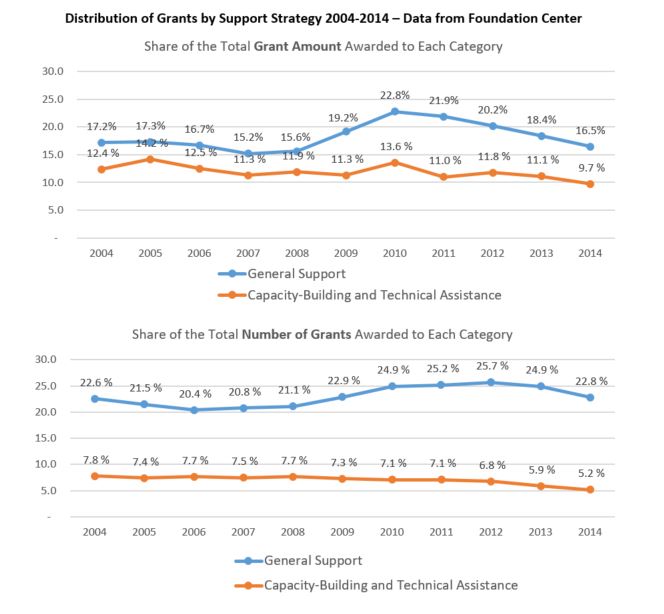Strengthening nonprofit organizations and providing general operating support have been discussion topics for decades in philanthropy. When CEP set out to conduct research on these issues late last year, we wondered what the results would reveal to move these conversations forward. Perhaps, we thought, in the wake of the new presidential administration we’d see a headline from our data about how nonprofits’ needs have changed, or how foundations have shifted to fill newly found needs. But that’s not what we found.
To our surprise, the starkest findings in our data were those that indicated how power dynamics between funders and nonprofits are getting in the way of nonprofits having their greatest needs met. ![]()
CEP’s new research report out today, Strengthening Grantees: Foundation and Nonprofit Perspectives, is based on the perspectives of 170 nonprofit CEOs and 187 foundation leaders overseeing programmatic work at their foundation. The study provides an overview of current practices and describes the roles nonprofits and foundations each have to play to close the gap between the support nonprofits need and what funders provide. The research was funded, in part, by the David and Lucile Packard Foundation and the James Graham Brown Foundation.
What Nonprofits Need
We found that when foundations do provide support to strengthen grantees, the effectiveness of their efforts may be thwarted by power dynamics that make it difficult for nonprofit CEOs to ask funders for what they actually need. Our research finds that when nonprofit CEOs request support, most ask for what they think funders want to provide, rather than what their organization needs for its future sustainability. This is problematic because most foundations give a great deal of consideration to grantees’ requests for specific support!
Nonprofit CEOs tell us that fundraising (42 percent), staffing (37 percent), and communications (26 percent) are the top areas that most commonly need strengthening. In fact, the data indicates that there is more need in particular for staffing and communications support than foundation leaders realize.
Not surprisingly, nonprofit CEOs also tell us that, among all the types of support their organizations receive, general operating support grants have the most impact on strengthening their organizations. CEOs say general support has more impact than capacity building or organizational effectiveness grants, as well as assistance beyond the grant.
A Lot of Talk, Only Some Action
While some foundations have made strengthening grantee organizations, leaders, or movements a focus of their work, our report finds that few foundations provide capacity-building grants, organizational effectiveness grants, or assistance beyond the grant to a majority of their grantees.
And while nonprofits and foundations have discussed the importance of general operating support for a while, only about one-third of foundation leaders responding to our survey say their foundation provides such grants to a majority of their grantees.
Our findings are in line with data from CEP’s Grantee Perception Report (GPR) and Foundation Center, indicating no increase over time in the provision of capacity-building, technical, or operating support — despite the rhetoric.

This is also what Grantmakers for Effective Organizations (GEO) found earlier this year in its report, General Operating Support: A Guide for Trustees.
So, where do we go from here? Our suggestion to nonprofits is to be more direct in asking for what they really need, as difficult and even anxiety-inducing as it may feel to do so. Remember, most foundations give great consideration to nonprofits’ specific requests for support; they’re asking about organizations’ needs because they want to help!
If you work at a foundation, the next time a nonprofit CEO responds to a question about their needs by trying to understand what it is that your foundation is interested in supporting, be aware of the dynamics that may be at play. This could be an opportunity for you to break the cycle that results in funders not addressing nonprofits’ most pressing needs.
Ellie Buteau is vice president, research, at CEP. Follow her on Twitter at @e_buteau. Charis Loh is manager, research at CEP.
Download Strengthening Grantees: Foundation and Nonprofit Perspectives here. Looking for more? Join CEP and a panel of foundation leaders on Monday, October 29 from 3:30-4:30pm ET for a webinar discussion of what foundations can do to best support and strengthen grantees, leaders, and networks. Register here.


